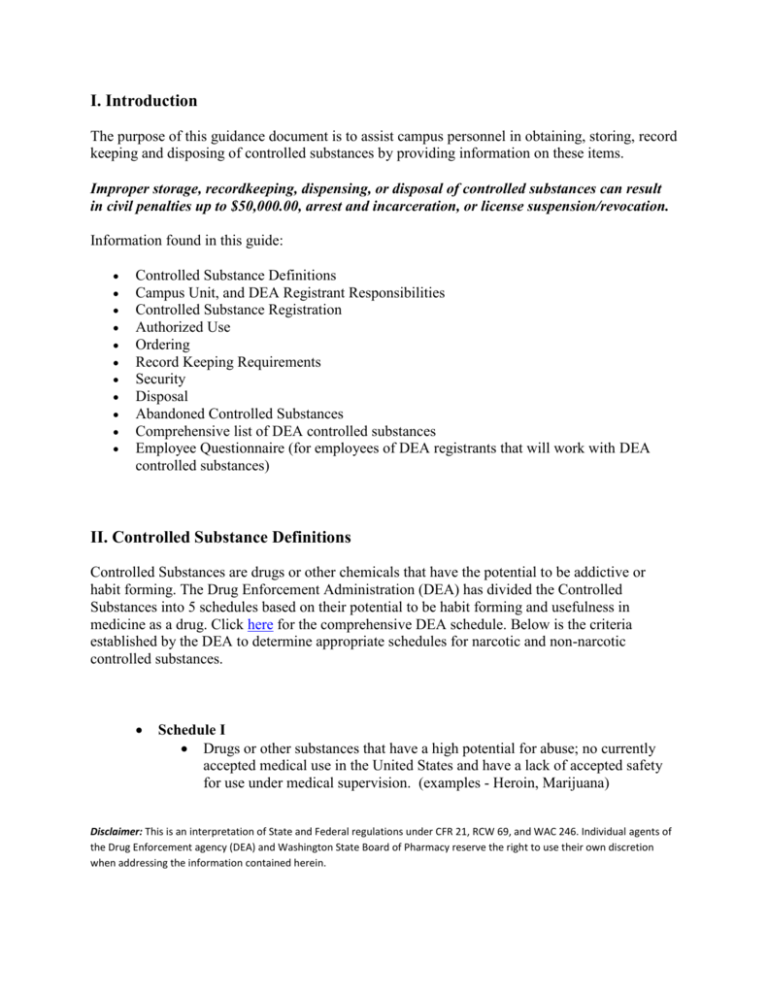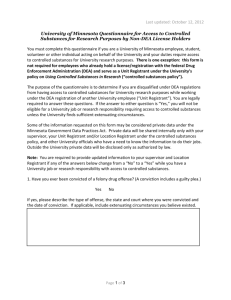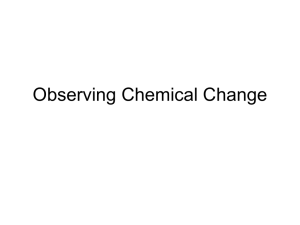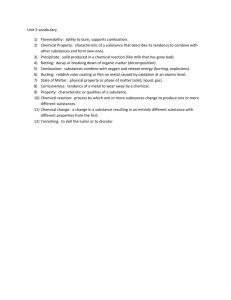I. Introduction The purpose of this guidance document is to assist
advertisement

I. Introduction The purpose of this guidance document is to assist campus personnel in obtaining, storing, record keeping and disposing of controlled substances by providing information on these items. Improper storage, recordkeeping, dispensing, or disposal of controlled substances can result in civil penalties up to $50,000.00, arrest and incarceration, or license suspension/revocation. Information found in this guide: Controlled Substance Definitions Campus Unit, and DEA Registrant Responsibilities Controlled Substance Registration Authorized Use Ordering Record Keeping Requirements Security Disposal Abandoned Controlled Substances Comprehensive list of DEA controlled substances Employee Questionnaire (for employees of DEA registrants that will work with DEA controlled substances) II. Controlled Substance Definitions Controlled Substances are drugs or other chemicals that have the potential to be addictive or habit forming. The Drug Enforcement Administration (DEA) has divided the Controlled Substances into 5 schedules based on their potential to be habit forming and usefulness in medicine as a drug. Click here for the comprehensive DEA schedule. Below is the criteria established by the DEA to determine appropriate schedules for narcotic and non-narcotic controlled substances. Schedule I Drugs or other substances that have a high potential for abuse; no currently accepted medical use in the United States and have a lack of accepted safety for use under medical supervision. (examples - Heroin, Marijuana) Disclaimer: This is an interpretation of State and Federal regulations under CFR 21, RCW 69, and WAC 246. Individual agents of the Drug Enforcement agency (DEA) and Washington State Board of Pharmacy reserve the right to use their own discretion when addressing the information contained herein. Schedule II Drugs or other substances that have a high potential for abuse; currently have an accepted medical use in treatment in the United States, or have a currently accepted medical use with severe restrictions; abuse may lead to severe psychological or physical dependence. (examples - Methamphetamine, pure Pentobarbital) Schedule III Drugs or other substances that have a potential for abuse less than Schedule I or II; currently have an accepted medical use in treatment in the United States; abuse may lead to moderate or low physical and high psychological dependence. (examples - Beuthanasia Solution, Ketamine, Testosterone) Schedule IV Drugs or other substances that have a low potential for abuse relative to those listed in Schedule III; currently have an accepted medical use in the United States; abuse may lead to limited physical or psychological dependence relative to those in schedule III. (examples - Valium, Butorphanol) Schedule V Drugs or other substances that have a low potential for abuse relative to Schedule IV; currently have an accepted medical use in the United States; abuse may lead to limited physical or psychological dependence relative to those in Schedule IV. (example - Pregabalin, Not more than 100mg of Opium per 100ml, or per 100g) III. Responsibilities DEA and State Board of Pharmacy Registrants Disclaimer: This is an interpretation of State and Federal regulations under CFR 21, RCW 69, and WAC 246. Individual agents of the Drug Enforcement agency (DEA) and Washington State Board of Pharmacy reserve the right to use their own discretion when addressing the information contained herein. 1. Be in compliance with Federal and State Laws. (state laws can supersede federal laws to make them more restrictive) 2. Have employees working with Controlled Substances fill out an employee questionnaire. (See section V-“Employee Questionnaire”) 3. Assure Controlled Substances ordered through the department are stored in a way that will not lead to theft or misuse. 4. Maintain proper record keeping for Controlled Substances. 5. Report any theft or loss of Controlled Substances. 6. Properly dispose of Controlled Substances. IV. Controlled Substance Registration Controlled Substance use in Washington requires registration with both: The Federal Drug Enforcement Administration Washington State Department of Health Board of Pharmacy Federal Drug Enforcement Administration Every person that engages in research with Controlled Substances must be registered with the Drug Enforcement Administration (DEA) or be an authorized user under a registrant. In some instances, the registrant may be a unit or department. There are different activities that require different registration types. Further, one registration type may not cover two different activities, such as research with controlled substances and dispensing of controlled substances. The required forms and detailed instructions are available on the DEA website: http://www.deadiversion.usdoj.gov/drugreg/reg_apps/index.html The following is a list of some types of registration for the Federal DEA: Research For conducting research on, or with, narcotic and non-narcotic controlled substances in Schedules II-IV. Mark the “Request Fee Waiver” box, then there should be no annual registration cost. The DEA form # 225 is submitted for this type of registration, with the following information required: o Investigator - Name, address, institution, state license, and a qualifications statement including a curriculum vita with bibliography for each investigator in the research project. Disclaimer: This is an interpretation of State and Federal regulations under CFR 21, RCW 69, and WAC 246. Individual agents of the Drug Enforcement agency (DEA) and Washington State Board of Pharmacy reserve the right to use their own discretion when addressing the information contained herein. o Project - Title, statement of purpose, controlled substance name and amount needed, location of research, security statement and a technical description of the substance use. Form #225A is used to renew this registration. Laboratory Chemical Analysis DEA form # 225 provides authorization to conduct analysis with controlled substances listed in any schedule. Form #225A is used to renew this registration. Dispenser of Controlled Substances- For Clinical Research DEA form # 224 is used by private practitioners (physicians, dentists, veterinarians, nurse practitioners, hospitals, and pharmacies) for clinical and hospital use. Form #224A is used to renew this registration. Instructional Activity DEA form # 224 is used to obtain a new instructional registration for instructional activity only, and covers schedule II-V Controlled Substances. Form #224A is used to renew this registration. Washington State Department of Health Board of Pharmacy In addition to registering with the Federal Drug Enforcement Agency, applicants in the State of Washington must also register with the Washington State Department of Health Board of Pharmacy. There is an annual registration fee (currently $40.00). The State fee cannot be waived. Like the DEA, there are different registrations for different activities involving controlled substances. Click here for Washington State controlled substance registration. V. Authorized Use The registrant is responsible for managing the controlled substances in accordance with the requirements of the regulations including inventory, record keeping and security provisions. Agents (designated employees) of the registrant may engage in approved activities under the direction of the registrant. The registrant is strongly encouraged to screen employees prior to authorization of work with controlled substances. Employee Screening DEA recommends that inquiries concerning employees' criminal records be made as follows: Local inquiries: Inquiries should be made by name, date and place of birth, and other identifying information, to local courts and law enforcement agencies for records of pending charges and convictions. Local practice may require such inquiries to be made in Disclaimer: This is an interpretation of State and Federal regulations under CFR 21, RCW 69, and WAC 246. Individual agents of the Drug Enforcement agency (DEA) and Washington State Board of Pharmacy reserve the right to use their own discretion when addressing the information contained herein. person, rather than by mail, and a copy of an authorization from the employee may be required by certain law enforcement agencies. DEA inquiries: Inquiries supplying identifying information should also be furnished to DEA Field Division Offices along with written consent from the concerned individual for a check of DEA files for records of convictions. The Regional check will result in a national check being made by the Field Division Office. Employee Questionnaire The following questions should be included on a questionnaire* as part of the screening process (21 CFR, 1301.90): 1. Within the past five years, have you been convicted of a felony, or, within the past two years, any misdemeanor, or, are you presently charged with committing a criminal offense? 2. In the past 3 years, have you knowingly used narcotics, amphetamines, or barbiturates other than those prescribed to you by a physician? Fill out one questionnaire for each employee who is authorized by the Principal Investigator (PI) to handle DEA controlled substances under that PI's supervision. Make copies of the form as needed for each employee who will be working with these substances. Keep these questionnaires on file at the registered location. Keep a blank copy of this form in your files for new hires to be completed before they are allowed to handle DEA controlled substances. An example can be found here. (Click on “appendix B”) *The questionnaire is recommended, but providing access to persons who would answer “yes” to either or both questions is a violation. VI. Ordering Schedule I or II Any person registered to conduct research with Controlled Substances in Schedule I or II must send, in triplicate, DEA order form # 222. Contact the drug supplier when ordering a Schedule I or II drug. The supplier will fax a copy of DEA form #222. After filling out the form, fax it back, and the order will be filled. Instructions for ordering DEA form #222 can be found at: http://www.deadiversion.usdoj.gov/faq/dea222.htm. Disclaimer: This is an interpretation of State and Federal regulations under CFR 21, RCW 69, and WAC 246. Individual agents of the Drug Enforcement agency (DEA) and Washington State Board of Pharmacy reserve the right to use their own discretion when addressing the information contained herein. Schedule I that is not commercially available Requests to obtain Schedule I Controlled Substances not commercially available must be made to the National Institute on Drug Abuse (301-443-1124) or http://www.nida.nih.gov/). Schedule III-IV Obtaining Schedule III-V Controlled Substances may be handled by invoicing normal records. Please assure that registration numbers for supplier and recipient are included on invoice. *All invoices for controlled substances must be identified with a red letter “C”, no less than one inch high on the bottom right corner of the invoice document. VII. Record Keeping Requirements The following records should be maintained at the registrant's location (as identified on the registration): Employee questionnaire and authorization records Executed order forms Inventory records (must be kept a minimum of two years from date of record) Drug dispensing records (must be kept a minimum of two years from the date of record) If the registrant wishes to maintain records at a central location other than the registered location, a notification must be sent to the DEA. More information regarding the information that will need to be submitted in the notification can be found at 21 CFR (code of federal regulations) 1304.04. Controlled Substance Tracking (an example tracking sheet follows this section) Records must be kept to track each container of Controlled Substances as well as records that detail each time a Controlled Substance was used. Every ml or mg of a controlled substance should be accounted for in the dispensing records. The tracking record must be bound and have sequentially numbered pages, and each controlled substance should have its own record. The drug tracking record must have an entry for each time any material was removed from the container, including any quantity wasted or disposed, and initials of the user. Records for Schedule I and II must be maintained separately from records for schedule III-V. Disclaimer: This is an interpretation of State and Federal regulations under CFR 21, RCW 69, and WAC 246. Individual agents of the Drug Enforcement agency (DEA) and Washington State Board of Pharmacy reserve the right to use their own discretion when addressing the information contained herein. Please note that it is a felony to provide a controlled substance to a person who is not registered with the DEA, or is not one of your authorized users. All transfers of controlled substances can only occur between two DEA registrants. Transfers of schedule I or II controlled substances must be accompanied by a DEA form 222 completed by the registrant receiving the substance(s). Disclaimer: This is an interpretation of State and Federal regulations under CFR 21, RCW 69, and WAC 246. Individual agents of the Drug Enforcement agency (DEA) and Washington State Board of Pharmacy reserve the right to use their own discretion when addressing the information contained herein. Drug Control Record Drug: Bottle Serial No.: Date Issued: Date Amount Used Vol. Amount Left Animal ID No. Investigator: Procedure User Initials Disclaimer: This is an interpretation of State and Federal regulations under CFR 21, RCW 69, and WAC 246. Individual agents of the Drug Enforcement agency (DEA) and Washington State Board of Pharmacy reserve the right to use their own discretion when addressing the information contained herein. Inventory Procedures Each person registered to handle Controlled Substances must complete an inventory annually as required by the Washington Board of Pharmacy. The inventory should be: Maintained at the registered location (unless a notification has been sent to DEA notifying that records will be maintained at a specified central location). Available for 2 years after the substance is used or is disposed. Updated on the effective date of a rule (from the DEA) when a substance is added to the Schedule (list of controlled substances). The inventory should have the following information: For Controlled Substances in finished form (i.e. commercially bought) An exact count of the dosage units must be made. Schedule I and II substances must be separated from other substances on the inventory. The inventory shall include the following: 1. 2. 3. 4. Name, address, and DEA registration number. Date the inventory was taken. Name of substance. The form of the substance (i.e., 10-milligram tablet or 10-milligram concentration per fluid ounce or milliliter); 5. The number of units or volume of each commercial container (i.e., 100-tablet bottle or 3milliliter vial); 6. The number of commercial containers of each substance form; 7. Sign and date form. For each substance not listed above (i.e. damaged, defective or impure substances) An exact count of the dosage units must be made, or the container must be graduated to reflect its content. Inventory shall include the following: 1. 2. 3. 4. 5. 6. Name, address, and DEA registration number; Date the inventory was taken. Name of substance. Total volume of substance or total number of units (i.e. 50 10mg tablets); Reason for the substance being maintained by the researcher Sign and date form. An example of a Controlled Substance Inventory form can be found here Disclaimer: This is an interpretation of State and Federal regulations under CFR 21, RCW 69, and WAC 246. Individual agents of the Drug Enforcement agency (DEA) and Washington State Board of Pharmacy reserve the right to use their own discretion when addressing the information contained herein. VIII. Security Researchers are generally permitted to keep Controlled Substances in a substantially constructed, double locked cabinet or safe. Schedules III-V, the Controlled Substance must be in a substantially constructed, double locked cabinet or safe. Schedules I and II, the Controlled Substance must in a substantially constructed, double locked cabinet, with the cabinet secured to a wall or otherwise not removable.It has been generally deemed acceptable to have the substances in a locked cabinet within a locked room to satisfy “Double Lock”. However, final determination of acceptability would be up to the field agent. It is unacceptable to have the keys to the cabinet left in the lab. Keys allowing access to the controlled substances must be in the possession of authorized individuals. If there is a theft or loss of controlled substances, The Washington State University Police must be notified as soon as the theft or loss is discovered. A DEA form 106 must be submitted to the DEA and the State Administrator must be notified within 10 days of the discovery of the theft or loss. DEA form 106 can be found at: http://www.deadiversion.usdoj.gov/21cfr_reports/theft/index.html. IX. Disposal When a DEA registrant has controlled substances that are expired or unwanted the registrant must submit DEA Form 41 to the DEA prior to destruction (disposal) with the following information: 1. Name, address of the facility wishing to dispose of the controlled substance 2. Name, address and DEA registration number 3. DEA Form-41, listing: a. Inventory of drugs to be destroyed b. Name of drug with strength c. Quantity of drug d. Technical name of controlled substance e. Signature of DEA notification Disclaimer: This is an interpretation of State and Federal regulations under CFR 21, RCW 69, and WAC 246. Individual agents of the Drug Enforcement agency (DEA) and Washington State Board of Pharmacy reserve the right to use their own discretion when addressing the information contained herein. After submission of the DEA Form-41, use the EH&S Chemical Collection Request (CCR) to arrange for the disposal of the substance. Be sure to indicate on the CCR that the substance is a registered controlled substance. Contact EH&S at 335-9564 for additional assistance or questions about controlled substance disposal. X. Abandoned Controlled Substances Under no circumstances are controlled substances to be abandoned by a DEA registrant. However, occasionally, faculty will leave without appropriately disposing or transferring all controlled substances from their lab. Sometimes the faculty acquired the controlled substance(s) before registration was required. Under these circumstances, the department responsible for the lab will need to contact EH&S to arrange for appropriate disposal. Depending on the situation, one of two procedures will be followed: If the faculty was a DEA registrant and it can be determined that the controlled substance(s) were acquired through their registration, the department will need to complete a DEA Form 41 with a cover letter providing all the information required for disposal (see section IX), in addition to explaining the circumstances as to why the registrant did not complete the Form 41. The department should contact EH&S to arrange for disposal. If the substance is also regulated by EPA or DOE, it will be disposed as prescribed by EPA or DOE. If the faculty was not registered with the DEA, and/or the controlled substance(s) was acquired prior to registration requirements (pre-1970 for many substances), the department should contact EH&S for disposal. If the substance is also regulated by the Environmental Protection Agency (EPA) or Department of Ecology (DOE), it will be disposed as prescribed by EPA or DOE. Any person who is registered with the DEA who violates record-keeping requirements or abandons controlled substances will be subject to the civil penalties outlined in the United States Code (USC): 21 USC Sec. 842. Please note that abandoning substances is equivalent to distributing a controlled substance to an unauthorized person. Disclaimer: This is an interpretation of State and Federal regulations under CFR 21, RCW 69, and WAC 246. Individual agents of the Drug Enforcement agency (DEA) and Washington State Board of Pharmacy reserve the right to use their own discretion when addressing the information contained herein.





